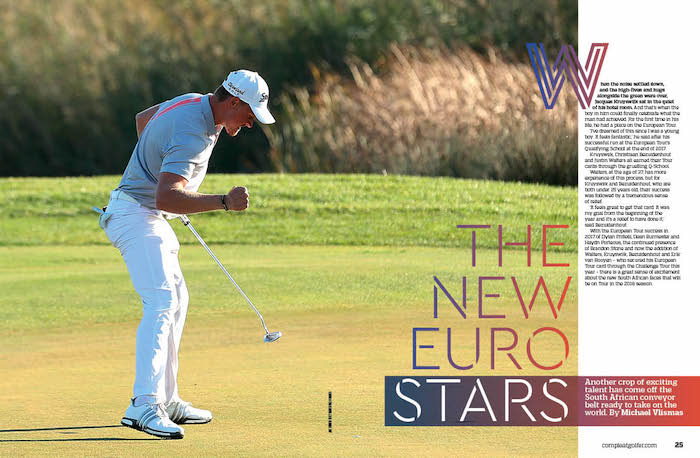Another crop of exciting talent has come off the South African conveyor belt ready to take on the world – first stop, the European Tour, writes MICHAEL VLISMAS in Compleat Golfer.
When the noise settled down, and the high-fives and hugs alongside the greens were over, Jacques Kruyswijk sat in the quiet of his hotel room. And that’s when the boy in him could finally celebrate what the man had achieved. For the first time in his life, he had a place on the European Tour.
‘I’ve dreamed of this since I was a young boy. It feels fantastic,’ he said after his successful run at the European Tour’s Qualifying School at the end of 2017.
Kruyswijk, Christiaan Bezuidenhout and Justin Walters all earned their Tour cards through the gruelling Q-School.
Walters, at the age of 37, has more experience of this process, but for Kruyswijk and Bezuidenhout, who are both under 25 years old, their success was followed by a tremendous sense of relief.
‘It feels great to get that card. It was my goal from the beginning of the year and it’s a relief to have done it,’ said Bezuidenhout.
With the European Tour success in 2017 of Dylan Frittelli, Dean Burmester and Haydn Porteous, the continued presence of Brandon Stone and now the addition of Walters, Kruyswijk, Bezuidenhout and Erik van Rooyen – who secured his European Tour card through the Challenge Tour this year – there is a great sense of excitement about the new South African faces that will be on Tour in the 2018 season.
‘It’s brilliant for South African golf. They’re all new faces and I don’t even know half of them. It’s great seeing our golf so healthy and the youngsters coming through like they are,’ said Louis Oosthuizen.
Stone is equally excited at the prospect of having more of his young countrymen out on the circuit with him.
‘It’s amazing and so good for us. I think we’ve now got something like six or seven players under the age of 28 on the European Tour. It’s awesome,’ he said.
South African golf has a proud record of its greatest golfers always having a star before them to look up to and emulate.
Gary Player had Bobby Locke. Ernie Els and Retief Goosen in turn had Player. Trevor Immelman and his generation had Els and Goosen. Charl Schwartzel and Oosthuizen also benefited from Els’ inspiration.
But there definitely appears to be an overlapping of the generations, as Schwartzel and Oosthuizen are still in the high of their careers, with a younger crop of stars in Porteous, Frittelli, Stone and Burmester seeking to emulate them, while at the same time inspiring an even younger set behind them.
This shared joy and talent progression, though, was very far from the mind of Kruyswijk in October 2017. That month the tall golfer from Centurion arrived breathless at Edinburgh Airport after receiving a late confirmation to play at the Alfred Dunhill Links Championship in St Andrews.
As a courtesy vehicle took him up to St Andrews, he had the usual thoughts of a young player trying to force his way on to the bigger stage with only his own dreams and credit card to back him.
‘It’s tough. It’s cost me a lot just to be here because I flew home from another tournament, thinking I wouldn’t make it in, and then only when I was home did I get the call, so I had to book a new flight rather than being able to change my existing ticket. But you can’t pass up on an opportunity like this.
‘We all know golf is expensive and you don’t always have the sponsors you need to get the financial support. That’s where the risk comes in. But I’ve got to back myself,’ Kruyswijk said as the Scottish countryside rolled by, and then finally revealed the hallowed golf destination.
‘Is that the Old Course?’ he asked, pointing out the window. His fellow passenger nodded. ‘I can’t believe it. Wow. That’s amazing.’ And as soon as he hit the streets of St Andrews, it was back to the reality of meeting up with a fellow South African professional and trying to secure new accommodation for the week as the place they were booked into was way too small to share.
Then came the high of playing three of the greatest links courses in the game – the Old Course, Carnoustie and Kingsbarns in a field of the biggest names in world golf and even bigger celebrities and sports stars.
That, in turn, was followed by a repeat of the frustration he’d endured for much of the season in South Africa when he missed the cut, by just one stroke.
‘I had a few close calls like that, and a few tournaments where I finished second or lost in a playoff. So, in the middle of this year I felt like I wanted to step back from the game because I wasn’t enjoying it. But I told my coach we have to push through because hard times will always be there in a career.’
Kruyswijk’s pragmatism is a valuable asset, and even at the age of 25 he shows a keen appreciation of the reality of professional golf to back up his unshakable belief in himself.
‘At my age you want to win everything you play in. You believe you can win every tournament you enter. Then you realise you need to accept that you won’t play your best golf all the time.’
And then, a few weeks later, Kruyswijk was sitting in a hotel room going through several WhatsApp and Facebook messages congratulating him on making it through Qualifying School.
‘I had so many friends and family members congratulating me. It was very emotional for me, especially when I finished my last round at Q-School, because it was something I worked so hard towards. And I hadn’t had the best of years leading up to it.
‘It just shows you, I got the result I needed at the end of the year. It all built up to a good performance at Q-School, and I was ready for that.
‘I backed myself 100% and this is a step to a bigger plan, one day. There was a lot of hard work to get to this point and even more hard work starts now.
‘But I know where I’m heading with my game. I definitely see myself winning on the European Tour soon. It’s time for me to start playing on the big stage and I’m going to work flippin’ hard to get to where I want to be eventually, which is on the PGA Tour. But I’m a European Tour member now and I’ll take it step by step.’
And he’s already trying to temper his excitement at being on the bigger stage with the reality of making a good enough start to the new season to improve his standing in April’s re-rank, and then to secure his card by the end of 2018.
‘All of a sudden I’m going to tee it up with golfers I’ve watched on TV and have dreamed of playing with. These are exciting times. It’s great to see so many young South African players doing well and it pushes all of us to perform better. Dylan Frittelli had an awesome season, as did Dean Burmester. When you look at South African sport it feels like our golf is at a pinnacle.
‘But having said that, I’m there to compete. I’m very excited for a huge 2018 season and I think I’m going to make a big success of it. I feel this is my time to step up and fly the South African flag proudly.’
Being part of this new wave of young South Africans is an equally exciting prospect for Bezuidenhout. He received recognition of what this means for professional golf in this country when Els was among the first to send him a message congratulating him on earning his European Tour card. And then he was invited to play at the pro-am for the Gary Player Invitational, and was congratulated by Player, too.
‘When you’re busy at Q-School you just play and play and play to get through all those rounds, and then all of a sudden you realise you’re so close to achieving your goal and the nerves kick in. It still feels a bit unreal, but I think when I start playing more on the European Tour in 2018 with some of the big names, it will sink in.’
But Bezuidenhout is also well aware of the challenge that lies ahead in the next few months to make an impact before the April re-rank.
‘I want to get in a good position for that re-rank. And then, ultimately, I want to be in the top 100 on the Race to Dubai at the end of the season to secure my card. It’s not an easy card to keep, because you don’t get into all the tournaments. But that’s my goal.’
The fast turnaround of the season is also sure to bring a professional back down to earth very quickly after a Q-School high.
The European Tour’s 2017 season ended in November. A week later the 2018 season teed off to remind the likes of Kruyswijk and Bezuidenhout not to take their eye off the ball before Christmas. Then, of course, the SA Open arrived early in January, too.
It’s something the experienced Darren Fichardt can relate to. The five-time European Tour winner can remember the feelings he experienced when he came through Q-School as the proud owner of a newly minted Tour card.
‘You get through Q-School and your eyes are set on winning tournaments because you haven’t played in big tournaments. So it’s all very exciting.You don’t know what to expect. It couldbe the next step to becoming top 10 in the world, or it could be a nightmare. It can be a very scary experience.
‘But making it through Q-School does give you the sense that you are moving in the right direction in your career. When you turn pro, you don’t know if you’re going to make it or not, so it’s almost a feeling of achievement when you get your European Tour card.
‘For me, getting a European Tour card was just one step. It wasn’t until I won a tournament on the Tour that I had that sense of belonging. Until that happened I didn’t feel like I belonged out here. You question whether you’re good enough. Once you win, that’s when you really feel like you belong on Tour.’
That sense of belonging is a critical component of what makes up the self-belief of a professional, and it’s something the younger Porteous can perhaps convey in a more relatable way to the likes of Bezuidenhout and Kruyswijk.
In 2013, Porteous was holed up in the little Spanish fishing town of Cambrils as he was making his way through the stages of Q-School.
‘I don’t know exactly where I stand in the pro game, and there’s the constant battle to prove to the golf world that I can play,’ he said at the time.
‘The toughest part of turning pro was the feeling of having to start right at the bottom and try to find your feet again. It’s that big-fish-in-the-small-pond and then small-fish-in-the-big-pond scenario.
‘Obviously, getting a Tour card would be great. But a better goal would be to keep your card that same year. It can be tough to do that as life changes quite a lot in 12 months.’
– This article first appeared in the January issue of Compleat Golfer







